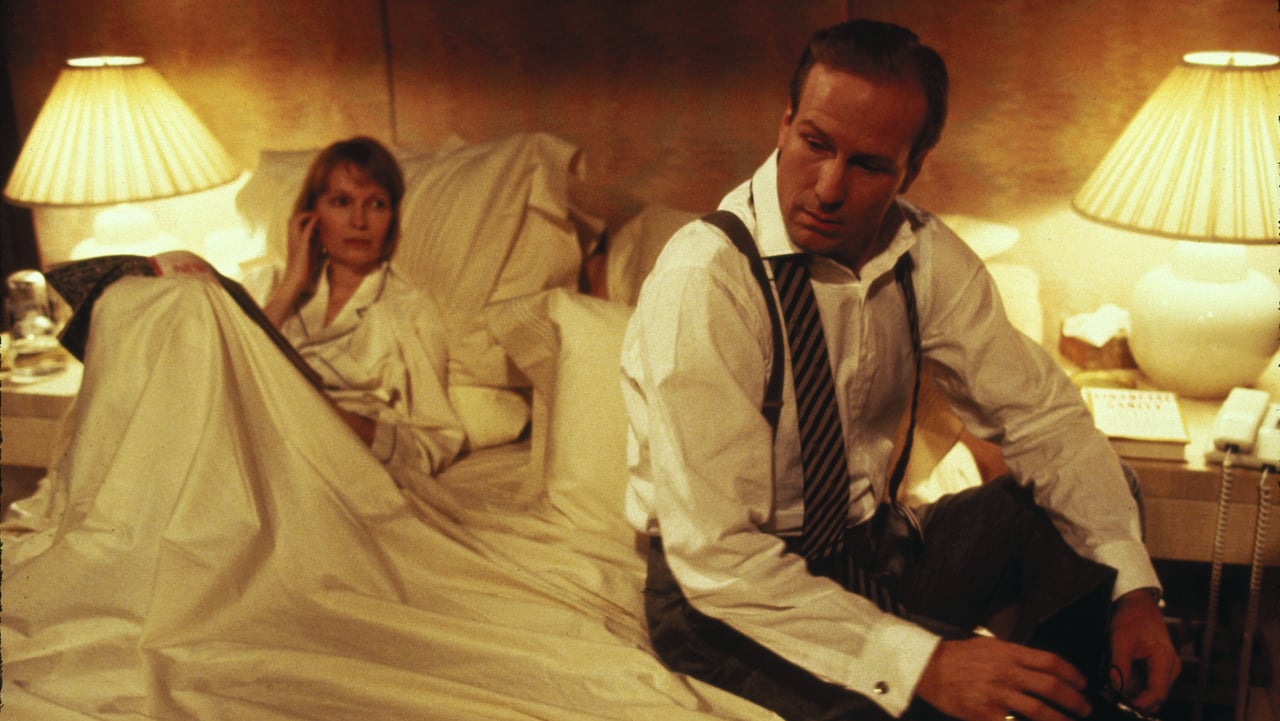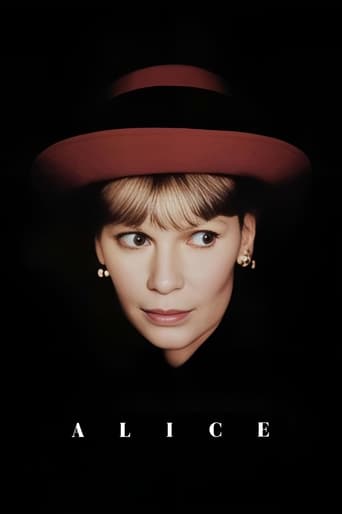

Very interesting film. Was caught on the premise when seeing the trailer but unsure as to what the outcome would be for the showing. As it turns out, it was a very good film.
... View MoreIn truth, there is barely enough story here to make a film.
... View MoreThis is a dark and sometimes deeply uncomfortable drama
... View MoreI didn’t really have many expectations going into the movie (good or bad), but I actually really enjoyed it. I really liked the characters and the banter between them.
... View More"Alice" suffers from an undramatic storyline. There is drama alright, but it is immediately sugarcoated. So this movie wanders a bit between wanting to be a comedy (without great jokes, bummer) and wanting to be dramatic, but served with too much sugar on top. It is still charming, acting is great, soundtrack is lovely. It is still a lovely Woody Allen film, but the sum total just falls flat. The mood of this picture is almost identical to the boring life style Alice is leading. She has got everything she could desire for moneywise, but she feels unfulfilled. She visits a chinese doctor who prescribes for her a special herbal medicine, which makes her invisible. Yes, that sounds silly. It is silly, but this is suppose to be the fun part. And although being invisible triggers some jokes, it becomes somewhat childish too after the first gimmick of being invisible has worn off. However new opportunities open up with these invisible making chinese medicine. Her life becomes adventurous again. But not without having to face some losses too...As I said at the very start. This movie just doesnt reach the quality of Woody Allen's earlier work. There are much better dramatic and funny pictures of Woody Allen to be found. Watch "Hannah and her Sisters" for a much better drama about marital betrayal. Watch " Purple Rose of Cairo" for a much better romantic comedy. And dont forget about some other classics that you must give a try because director and writer Woody Allen has made such a wonderful line of work. Really anything from the eighties down to the seventies is worth watching. Halfway through the nineties Woody Allen lost some of his magic touch that sparkled so brightly in his older work. "Alice" is still a charming picture. More senior older people who are first time viewers will surely enjoy this movie. But for younger people who long for more romance or comedy or long for more true to life drama there are a lot of much better Woody Allen films out there.
... View MoreA spoiled Manhattan housewife (Mia Farrow) re-evaluates her life after visiting a Chinatown healer (Keye Luke).So, this film has the interesting historical footnote of being the first films for both June Squibb and Lisa Marie. This is about the best thing that can be said for the film. (Actually, the cast as a whole is pretty darn good.) This is supposed to be Woody Allen's take on "Alice's Adventures in Wonderland". Well, yes, it certainly is that. But if the lead character was not named Alice, perhaps the viewer would never make that connection. There seems to be less Alice here than there ought to be.One has to wonder about the Mia Farrow years versus the Diane Keaton years. Maybe it is the writing, maybe the directing, but it seems that the Keaton years of Woody's work were so much stronger than the Farrow years. In some films, particularly "A Midsummer Night's Sex Comedy", Farrow is just downright awful.
... View More"Alice" can be seen as Woody Allen's version of magic realism. It makes use of magic, but does so not in the context of myth, fairy-tale or fantasy but in the context of contemporary real-life America. The title character, Alice Tate, is an upper-middle-class New York housewife. Alice is married with two children, but her marriage is not a happy one. Her husband Doug is wealthy and good-looking, but cold, dull and unresponsive to her needs. The film explores what happens two strangers come into Alice's life. The first is Joe Ruffalo, a handsome musician to whom she finds herself attracted. The second is the mysterious Chinese herbalist Dr Yang, who is treating her for backache. Dr Yang prescribes a series of herbal treatments for her, but it is clear that these are much more than just backache remedies. Indeed, these herbs have magical properties. One type takes away her inhibitions and make her act on her feelings towards Joe; another type makes her invisible, enabling her to watch both Joe and Doug unseen. A third enables her to communicate with the ghost of her now deceased first lover Ed. The film is very different in its overall tone to Woody's previous offering, "Crimes and Misdemeanours" made a year earlier. Yet there is also a similarity between the two films. "Alice" can be seen as continuing the debate about religion which began in the earlier film, Given that Woody is normally thought of as a religious sceptic, "Crimes and Misdemeanours" came as something of a surprise to me with its positive view of religion, especially the sympathetic view taken of Sam Waterston's Rabbi, a man whose religious faith enables him to bear the prospect of blindness with stoicism. Although physically he is losing his sight, morally he can see more clearly than any other character in that film. In "Alice" the religious debate takes place in the context of Catholicism rather than Judaism. Although she no longer practises her religion, Alice was raised as a Catholic. (As was Mia Farrow who plays her; Mia's original name was the very Catholic Maria de Lourdes Villiers-Farrow). The film's view of Catholicism is a mixed one. One the one hand, Alice's Catholic upbringing is seen as a source of sexual guilt. On the other hand, Catholicism is also seen as a source of humanitarian idealism. As a girl and young woman, Alice's was to help people like Mother Theresa, whom she greatly admired. As a middle-aged married woman she has lost sight of her idealistic goals and leads a luxurious, materialistic lifestyle, dominated by shopping, beauty treatments and gossip. Religion can therefore be seen as being the partial cause of Alice's problems in that it causes her to feel guilty about her feelings for Joe. (There is a suggestion that her backache is psychosomatically linked to these guilt feelings). It can, however, also be seen as part of the solution to those problems, as she eventually rediscovers her earlier idealism. Another link between this film and "Crimes and Misdemeanours" lies in their colour schemes. In the earlier film the predominant colours were browns, greys and dull yellows and oranges. Here similar colours predominate, except that they are also relieved by brighter oranges and reds. This may have been intended to symbolise the difference in tone between the two films. "Crimes .." is one of Woody's darker films, combining humorous and serious stories, although even the humour is often of a dark, cynical nature. "Alice", by contrast, is generally lighter and more playful, a comedy raising serious issues as opposed to a serious film lightened by humour. Magical realism in the cinema is not always successful; "Practical Magic", for example, which likewise tried to introduce magical elements into a modern-day realistic setting, is a hopeless mess of a film, one of my least-favourite movies of the nineties. "Alice" is a considerably better film than "Practical Magic"- it would be difficult to be worse- but I nevertheless got the feeling that Woody was never entirely happy with his supernatural subject-matter and does not handle it as deftly as he did in, for example, "The Purple Rose of Cairo", another film of his which includes fantasy elements. Although this is not her best collaboration with Allen- that was probably "Hannah and Her Sisters"- Mia Farrow makes a likable heroine and there are also good performances from Alec Baldwin as the ghostly Ed and William Hurt as Doug. Overall, this is a generally enjoyable film, with some amusing scenes, but it does not really count as one of Allen's great works. 6/10
... View MoreWithin 5 minutes of watching this film for the first time, I commented on how nice it was to see a Woody film without having to see or hear him. I love the man to death, but there is much more to his aesthetic than the four-eyed doomed, dreamer lamenting about death and mortality in an internal monologue along the streets of Manhattan. (This thought wasn't helped by my 10 Allen films in 3 days marathon).Case in point - Alice. I knew that something was up when a lovely version of La Cumparsita started playing in the background, teasing you with it's back-and-forth melody. Alice is a delightful tale that manipulates you with its pacing - lingering on seemingly mundane moments and whisking you away from deliberate flights of fancy (e.g. the afternoon of invisibility with Alec Baldwin) that leave you wanting much more. Allen repeats himself on that front with Vicky Christina Barcelona, but that's a tale for another thread.All in all, I'd take a chance on watching this film on more than one occasion. You won't regret it.
... View More